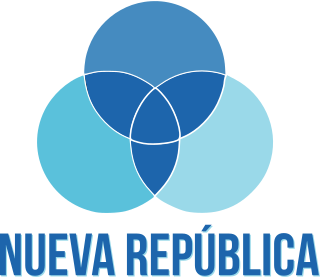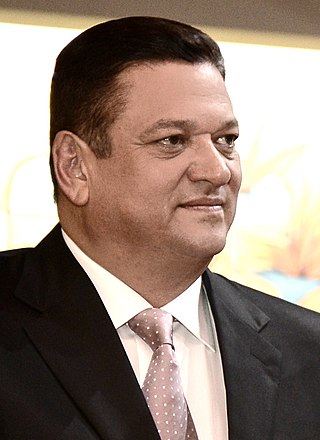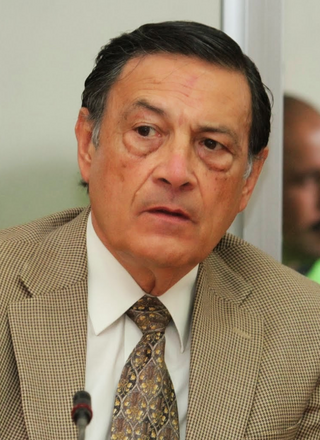
Grecia is a district of the Grecia canton, in the Alajuela province of Costa Rica.

Costa Rica is administratively divided into seven provinces which are subdivided into 84 cantons, and these are further subdivided into districts. Cantons are the only administrative division in Costa Rica that possess local government in the form of municipalities. Each municipality has its own mayor and several representatives, all of them chosen via municipal elections every four years.

Santa Ana is the ninth canton in the San José province of Costa Rica. It is located in the Central Valley. It borders with the Alajuela canton to the north, the Mora canton to the south and west, the Escazú canton to the east, as well as the Belén canton to the north east. As of 2020, the canton has the highest Human Development Index of any region in Costa Rica with a HDI of 0.871.

According to the Political Constitution of Costa Rica of 1949, in article 168, the territorial division of Costa Rica is organized by law into three types of subnational entity:

General elections were held in Costa Rica on 7 February 2010. The ruling party before the election, the center-left National Liberation Party, put forward former Vice-President Laura Chinchilla as its presidential candidate, while the libertarian, Movimiento Libertario nominated former legislator Otto Guevara. Opinion polls before voting started consistently put Chinchilla as the front-runner, a trend confirmed in the election-night count, which showed her garnering 46.76% of the vote.

General elections were held in Costa Rica on 2 February 1958. Mario Echandi Jiménez of the National Union Party won the presidential election, whilst the National Liberation Party won the parliamentary election. Voter turnout was 64.7%.

General elections were held in Costa Rica on 6 February 1966. José Joaquín Trejos Fernández of the National Unification Party won the presidential election, whilst the National Liberation Party won the parliamentary election. Voter turnout was 81%.

Municipal elections were held in Costa Rica on 7 February 2016, in order to elect the mayors of the 81 cantons of the country plus a proportional number of aldermen (regidores) in each of the canton's municipal councils, a syndic for every district and members of the District Councils and a total of 8 Intendants for districts and islands located too far away from the administrative center.

Municipal elections were held in Costa Rica on 5 December 2010. Were the third municipal elections in the history of the country and the last on be held in December of the same electoral year due to an electoral reform that turned municipal election to be held mid-term. Because of this the Electoral Supreme Court mandate the constitutional period of the newly elected authorities to last for 6 years for one unique time. The election was for mayors of the 81 cantons, syndics and district councilors for all the country's districts and 8 Intendants for 8 especial autonomous districts.

The 2006 Costa Rica local elections were held on December 3, 2006. In the February 2006 general elections, Costa Rica elected president, vice-presidents, deputies of the Legislative Assembly and municipal councilors in the general elections. The December 2006 elections were held to elect cantonal mayors, members of the District Councils of each of the nation’s districts and intendants of eight special autonomous districts and islands.

Municipal and local elections were held for the first time in Costa Rica on 1 December 2002. This was the first time citizens of the 81 cantons were able to directly choose their mayors as previously the municipal executive was appointed by the city council. A syndic and 4 District Councilors were also elected for each canton’s district as 8 intendants for especial districts with administrative autonomy.

Costa Rica’s municipal system is organized under the Municipal Code, the specific law that regulates the local governments. Municipalities are the second-level administration in Costa Rica after the central government. Each one of the 82 cantons of Costa Rica has a Municipality or Municipal Government constituted by a mayor and a proportional number of members of the Municipal Council. Districts of each of the cantons also have their local authorities and representatives. Some of the services manage by local governments include; solid waste management, building and administration of local roads, parks, libraries and schools, recollection of municipal taxes and in some cases local security. Worth noticing that in Costa Rica city and municipality are not the same thing, as a canton can have several cities within its borders, generally as districts.

According to the Territorial Administrative Division, the cantons of Costa Rica are subdivided into 492 districts (distritos), each of which has a unique five-digit postal code.

The Workers' Party is a far-left Trotskyist political party of Costa Rica. The party was founded on 1 May 2012 on the basis of the student organization Movement toward Socialism led by labor union leader and lawyer Hector Monestel, and currently holds no seats in parliament nor municipal offices. It is a member of the International Workers League – Fourth International. Highly critical of the more moderate Broad Front, it proclaims itself as a "classist and socialist alternative". Internationalism is one of its guidelines and as such it proposes the re-establishment of the Federal Republic of Central America abolished in 1838, reuniting all Central American countries in one single socialist Federation. It also defends feminist, environmentalist and pro-LGBTI ideas.
Quitirrisí is a district of the Mora canton, in the San José province of Costa Rica.

The New Republic Party is a Costa Rican Christian-conservative political party founded on 20 October 2018. The party was founded after the resignation of the evangelical singer and journalist Fabricio Alvarado Muñoz from the Christian party National Restoration for disagreements with the Executive Committee chaired by Congressman Carlos Avendaño. Alvarado was the latter's presidential candidate in the 2018 elections of major significance, since he was the most voted in the first round with 25% of the votes, qualifying for the run-off, but was defeated by the Citizen's Action Party nominee Carlos Alvarado Quesada.

The municipal elections of the canton of San José, capital of Costa Rica, of 2006 were held on December 3 of that year. This process was the second occasion in the modern history of the country where elections were held for the election of the capital's mayor. San José, besides being the capital of the country, is the most populated canton.

The San Jose municipal elections of 2010 were held on Sunday December 5 to elect the mayor, deputy mayors, syndics and district councilors of the central canton of San José, capital of Costa Rica. Due to legal reform unifying the municipal elections with those of aldermen, the Supreme Electoral Tribunal decreed that for a single time the authorities elected in these elections would hold office for six years, so the next elections would be in 2016.

Referendums in Costa Rica are regulated by law. The main juridical body that regulates is the Law of Referendum or Law 8492. To this date the only nation-wide referendum done since the current Constitution and the afore mentioned referendum regulatory law is in place was the 2007 Costa Rican Dominican Republic – Central America Free Trade Agreement referendum.

Municipal elections were held in Costa Rica on Sunday, February 2, 2020, to elect all municipal offices in the country: mayors, aldermen, syndics, district councilors and the intendants of eight special autonomous districts, together with their respective alternates in all cases. These will be the fifth direct municipal elections since the amendment to the 1998 Municipal Code and the second to be held mid-term since the 2009 reform.













